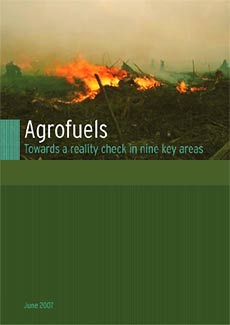The rush for biofuels or “agrofuels” is already causing serious damage, according to a new report by eleven civil society organisations from around the world. The report finds that agrofuels threaten to greatly accelerate climate change through the destruction of ecosystems and carbon sinks on which we depend for a stable climate. The rush to agrofuels encourages intensive, industrial agriculture at the expense of sustainable food production.
 The report “Agrofuels – towards a reality check in nine key areas” sets out considerable evidence that the spread of what are more accurately called agrofuels – liquid fuels produced from biomass grown in large-scale monocultures, mostly in the global south – is compromising biodiversity and fuelling human rights violations.
The report “Agrofuels – towards a reality check in nine key areas” sets out considerable evidence that the spread of what are more accurately called agrofuels – liquid fuels produced from biomass grown in large-scale monocultures, mostly in the global south – is compromising biodiversity and fuelling human rights violations.
“Monoculture plantations have been doing serious damage around the world for decades, but agrofuels represent a further intensification of the process, endangering what remains of global forest cover and climate. They also threaten the food sovereignty, cultural, human and land rights of indigenous peoples and local communities. The destructive impact of these agrofuels is already severe, while the pros and cons are being debated and certification initiatives are being devised. It is likely that by the time any real analysis has been completed, further irreversible damage will have been done to biodiversity and the climate” says Helena Paul of Econexus.
“Claims are being made that biofuels will mitigate climate change, yet the reality is very different. The rapid expansion of agrofuel monocultures is speeding up the destruction of peatlands, tropical forests and other ecosystems, leading to massive greenhouse gas emissions. In a worst case scenario, further deforestation for agrofuels could push the Amazon forest into rapid die-back, releasing up to 120 billion tonnes of carbon and disrupting rainfall patterns over much of the northern hemisphere,” says Almuth Ernsting of Biofuelwatch.
The authors highlight how agrofuels are being used as a new promotional vehicle for GM technologies, in particular through the development of “second generation” crops. Agrofuel expansion also threatens to displace indigenous peoples from their lands.
“The whole agrofuel process is going far too fast, pushed by corporations and governments before any controls are in place. Massive investment in infrastructure is already taking place around the world that will set us on a path from which it will be difficult to escape,” says Oscar Reyes of the Transnational Institute.
A call for a moratorium on EU incentives for agrofuels, EU imports of agrofuels and EU agroenergy monocultures was launched in Brussels last week by the same eleven organisations. It has already attracted the support of over 100 organisations worldwide.
Agrofuels – towards a reality check in nine key areas is co-published by: EcoNexus, Biofuelwatch, Carbon Trade Watch (Transnational Institute), Corporate Europe Observatory, Ecologistas en Acción, Ecoropa, Grupo de Reflexión Rural, Munlochy Vigil, NOAH (Friends of the Earth Denmark), Rettet den Regenwald, Watch Indonesia
Contents of the report
1. Do agrofuels really mitigate climate change?
2. Are agrofuels a promotional instrument for GE crops and what biosafety risks do they pose?
3. Second Generation Agrofuels: How do unproven promises of future technological fixes shape the present debate?
4. How will large scale agrofuel production affect biodiversity?
5. Does the structure of global agrofuel production threaten food security?
6. What is the real impact of agrofuels on rural development and jobs?
7. Is there a link between agrofuel monoculture plantations and Human Rights Violations?
8. Do current ‘Sustainability Certification’ initiatives for biomass/agrofuels form a real and credible solution?
9. Will the voices of experience, resistance and opposition of the affected groups from the South be heard?
Documents
- Full report: Agrofuels – towards a reality check (PDF-document)
- Executive summary: Agrofuels – towards a reality check (PDF-document)
- Call for an immediate moratorium on EU incentives for agrofuels, EU imports of agrofuels and EU agroenergy monocultures (PDF-document)
Contact
- Deepak Rughani, Biofuelwatch
phone: 00 44-79 31-63 63 37
email: dee.rughani@btinternet.com - Nina Holland, Corporate Europe Observatory
phone: 00 31-63 028 50 42 - Oscar Reyes, Transnational Institute
phone: 00 31-647 03 57 78
email: oscar@tni.org - Helena Paul, EcoNexus
email: h.paul@econexus.info
(Cf. news of 2007-03-12, 2007-03-02 and 2007-06-29.)
Source
Transnational Institute, press release, 2007-07-03.
Share
Renewable Carbon News – Daily Newsletter
Subscribe to our daily email newsletter – the world's leading newsletter on renewable materials and chemicals









